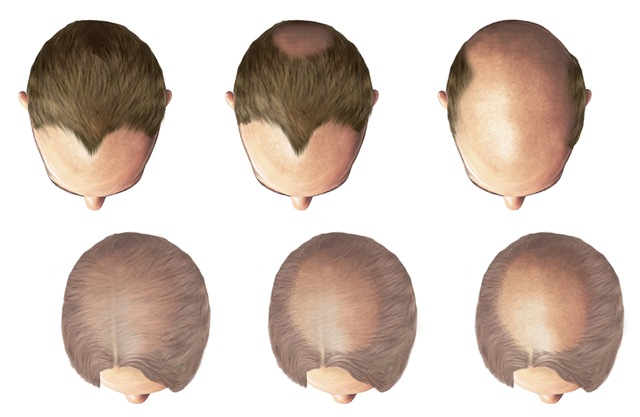Falling Out: Men in Search of Treatments for Baldness

Baldness is a condition that inherently every man fears at one point or another in their life. Many men take their hair seriously, and the thought of losing it is not pleasant. There are quite a few different reasons that cause a man to exhibit hair loss, many of which are factors in almost anyone’s life. Baldness, contrary to popular belief, can be treated or possibly even prevented with certain remedies. There are even benefits against baldness from certain pharmaceutical medications, but they are not without risks. Baldness, with a little knowledge on the subject, is much less scary than it may seem.
Table of Contents
Content
What Causes Male Baldness?
Genetic Reasons Of Receding Hair
Sometimes, it is simply old age or genetics that cause the receding of a hair line. Many men must accept male pattern baldness, an inherited attribute via genetics that causes the recession of the hair line on the forehead and the thinning of hair on the crown. A large reason this happens is the presence of DHT, or dihydrotestosterone, affecting the size of the hair follicles on the male head.
This leads to a miniaturization of the hairs as well as the follicles they reside in, causing the common appearance of male pattern baldness. As previously mentioned, male pattern baldness is determined in large by specific genes. Though it is common belief that baldness is hereditary solely based on the maternal side of the family, both sides of the family contribute to the situation. This idea stems from studies showing the x-chromosome and hair loss to be linked. Genetic baldness is not curable, but it can be treated.
Now you may think that hair loss is in your genes and that there is no avoiding the inevitable, but this is not always true. Multiple factors lead to hair loss in the average male, some that you may not even expect would do so.
Infections Can Cause You To Lose Hair
Infections such as the flu, for example, can cause your body to exhibit high temperature due to fever and lead to slight hair loss. Different thyroid and pituitary conditions can lead to the loss of hair. The use of steroids leads to receding and thinning hair as well.
A fungal infection or ringworm on the skull can lead to a disruption of the hair follicles and subsequent hair loss. Medical treatments, such as chemotherapy, cause hair loss in any gender. Dealing with a high stress environment, or simply being under a large amount of stress can lead to hair thinning and eventual balding in men.
How You Can Treat Baldness Naturally
As for treatment of baldness there are natural remedies that many men swear work wonders and, perhaps, some of them do. Many take the herbal route of treatment, supplementing their diets with rosemary tea, various oats, and the popular echinacea. Some may find herbal aromatherapy helpful for relieving both stress and hair loss.
Ginger and Lavender rubs are common aromatherapy rubs created from essential oils. On a less herbal scale, many find that increasing their intake of protein and vitamins will help alleviate hair loss, especially vitamins such as B complex, magnesium, calcium, and vitamin E.
Pharmaceutical Treatments For Baldness
There are pharmaceutical methods of treatment for baldness on the market. These are particularly in the form of the prescription drug Finasteride and Minoxidil, which you may know by the common brand names Propecia and Rogaine. Minoxidil is a highly marketed product advertising the regrowth of hair follicles, though it is not completely proven how it works.
Rogaine claims it has a success rate of 30-40% with 50-60% success rates using Rogaine extra strength. Propecia works by preventing further shrinkage of hair follicles, and claims a regrowth rate of 48% of users. These benefits are not achieved without the risk of side effects.
Propecia asserts that a relatively small number of men experience a decreased sex drive, difficulty in achieving an erection, and lower semen count. On top of this it causes a number of problems in the same area.
Rogaine has its side effects as well; including irritation of the application area, unwanted hair growth elsewhere on the body, occasional allergic reactions, dandruff from scalp dryness, collagen depletion, and on top of this it is highly toxic to cats. Ironically enough, another side effect of Minoxidil is hair loss. The risk of pharmaceutical treatment is evident, and the choice is up to you.








